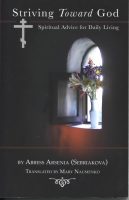“What brings sweetness is harder to perceive than that which brings bitterness”
Abbess Arsenia
 I am reading a collection of letters by Abbess Arsenia, a nineteenth century Russian nun who acted as a spiritual mentor for Peter Brianchaninov, brother of St. Ignatius Brianchaninov. St. Ignatius Brianchaninov is perhaps most famous today for his book, The Arena, in which he lays out some very practical and insightful advice for monks and anyone zealous for God living in the modern world—a world largely devoid of God-bearing spiritual fathers and mothers such as we read about in ancient spiritual texts. For example, St. Ignatius writes about the necessity of freedom and discernment when seeking to acquire obedience—which is still possible—even without a god-bearing elder as one’s spiritual father or mother. The Arena, especially part one, “Counsels For The Spiritual Life of Monks,” should be read by everyone who desires to attain to a spiritual life in the Church.
I am reading a collection of letters by Abbess Arsenia, a nineteenth century Russian nun who acted as a spiritual mentor for Peter Brianchaninov, brother of St. Ignatius Brianchaninov. St. Ignatius Brianchaninov is perhaps most famous today for his book, The Arena, in which he lays out some very practical and insightful advice for monks and anyone zealous for God living in the modern world—a world largely devoid of God-bearing spiritual fathers and mothers such as we read about in ancient spiritual texts. For example, St. Ignatius writes about the necessity of freedom and discernment when seeking to acquire obedience—which is still possible—even without a god-bearing elder as one’s spiritual father or mother. The Arena, especially part one, “Counsels For The Spiritual Life of Monks,” should be read by everyone who desires to attain to a spiritual life in the Church.
However, today I want to think a little bit about St. Ignatius’ brother, Peter, and some of the advice given to him by his spiritual mentor, Abbess Arsenia. Peter was not a monk (not until the very end of his life), but he was a devout person who struggled for godliness in the world. Abbess Arsenia was a disciple of St. Ignatius, Peter’s brother, and in her letters she seems to interpret some of St. Ignatius’ insights in ways that his brother Peter can begin to accept and apply. One particular area where Abbess Arsenia advises Peter is on how to read, or rather, not read, spiritual books.
When Peter tells Abbess Arsenia that he is reading Peter of Damascus (one of the authors in the Philokalia), she gives him the following rebuke and advice:
“I question whether it will be of use for you to read him on your own. Were you to read it simply as though it were the word of God—inaccessible to our understanding, interpretation and assimilation—then any book would be harmless for you to read. But you want to assimilate it all and take it by force; therefore the most useful words become harmful…. One must know one’s limits and hold to that word that is commensurate to one’s limit, that of an unenlightened person.”
Notice how Abbess Arsenia speaks of the wrong way to read spiritual texts. It’s exactly the opposite of how we normally read. Normally, we read with the assumption that what is written is accessible to our understanding and that we can interpret and assimilate the information. This may indeed be the case if we are reading anything except spiritual literature. When we read about science or philosophy or any human enterprise, we expect that we will understand it (if we have had sufficient preparation and background in the field). However, literature that is written to speak to our spiritual mind, our nous, is different. It cannot be assimilated and understood, for it is not written for assimilation or understanding. Rather, it is written to enlighten and to transform us, not to inform us.
When we read spiritual literature to assimilate and understand it, then, as Abbess Arsenia says, “the most useful words become harmful.” This saying, in one form or another, is a common saying among the spiritual writers in the Christian tradition. Many holy fathers and mothers of the Church have pointed out that spiritual words are like powerful medicine. If taken inappropriately, what was designed to heal ends up causing harm. A powerful opioid can help facilitate healing when used properly. Improperly used, it can lead to addiction and death.
How then do we read spiritual literature so that it doesn’t make us worse rather than better? We read it as the word of God. Yet nowadays, most people do not read even the Bible itself as the word of God—at least not as Abbess Arsenia recommends that we read it: as “inaccessible to our understanding, interpretation and assimilation.” Most of us, myself included, tend to think we are supposed to understand the Bible. We think that with sufficient application we can correctly interpret and even assimilate what the Bible teaches. Oh, we may give lip service to the role of the Holy Spirit. We may say that only God can enlighten us regarding spiritual things. However, I don’t think most of us actually read the Bible or an other spiritual texts with the expectation of not understanding, utterly dependent of God for revelation and enlightenment. Rather, we most often read trying to understand with our rational minds, assuming that we can understand if we only apply ourselves sufficiently; consequently, we end up thinking we understand. And that’s how spiritual texts become dangerous.
All sorts of heresy and violent fundamentalism is not only justified but actually fuelled by merely rational understandings of spiritual texts. And I’m not referring to something outside my own soul. I’m not referring to heretical groups or fundamentalist movements (these are just societal manifestations of what is happening in each human soul). I am referring to the heresies spawned in my own heart because I’m trying to fit together in my own mind spiritual truths that point to realities outside of the created order, spiritual truths that even the greatest thinkers of the Church have only been able to speak of apophatically. When I try to understand, for example, the nature of the Trinity with my rational mind, I can only end up in heresy. It was one of the Cappadocian Fathers, I think, who said, “The Trinity is a cross for the mind.” It is possible for human beings to know God as three Persons, but it is not possible for the rational mind to understand, interpret or assimilate this. Similarly, when I try to reconcile the justice and mercy of God or try to define any of the mysteries of our faith in some way that I can understand, I inevitably end up creating heresy
Thinking I understand spiritual matters also produces violent fundamentalism in my heart. This fundamentalism usually takes two forms, both violent (even murderous). When I think I have understood, properly interpreted and assimilated spiritual texts, then I tend to become either triumphant or despondent. I become triumphant when I think I am in, when I think I have covered my bases, when I think I have sufficiently fulfilled or applied the spiritual text that I think I understand. And once I am triumphant, then nothing is left but for me to judge others. And this judgement of others, at least in my own sinful heart, generally leads to my condemning of others as being too hard hearted or too stupid, or too worldly or too something to understand as clearly as I do whatever it is I am judging them about. When this triumphant attitude is in my heart, I easily dismiss others and condemn those who get in my way. I even justify hatred.
However, the more murderous result of violent fundamentalism in my experience comes not from triumphalism, but from despondency. When I think I understand and I don’t think I am in, don’t think I’ve covered my bases, or don’t think I have sufficiently fulfilled or applied the spiritual text that I think I understand; then I condemn and murder my own soul. Because I think I understand, I think I am excluded: I am unworthy so I think I am rejected. This cutting off of my self from the mercy of God comes largely because I think I understand. I see how far short I fall of this or that teaching of the Church, how miserably unable I am to keep even the smallest discipline, and I conclude based on my supposed understanding of these or those texts that I am rejected, I am excluded (or that I should exclude myself) as outside of the reach of the mercy of God.
But St. Paul teaches how we are to read spiritual texts and understand any spiritual matter. When he writes to the Corinthians about the matter of meat sacrificed to idols (1 Cor. 8: 1, 2) he says, “Now concerning things offered to idols: We know that we all have knowledge. Knowledge puffs up, but love builds up. And if anyone thinks he knows anything, he knows nothing as he ought to know.” The only rational knowing of spiritual things that does not destroy us is when we know that we don’t know as we ought. Sure, there is information and data that can be known. There are teachings and dogma and sayings of holy men and woman that can be memorized and understood to a certain extent. But it is only in knowing that we do not know as we ought to know that we are kept safe from heresy or violent fundamentalism. When we don’t know, then we can be enlightened—not so that we can rationally understand, but so that we can be transformed. When we know that we don’t know, then we can love even those who disagree with us. When we know that we don’t know, then we can be merciful even toward ourselves, trusting in God’s love and mercy, not in our own ability to understand, interpret and assimilate God’s commands or the advice of holy fathers and mothers.
Reading any spiritual text as the word of God means reading with a presumption that you only see a little, only perceive a dim reflection of what is actually being said. Reading a spiritual text as the word of God means that the fruit of the Spirit must guide you, not your rational understanding. If a word that you think you understand is not producing the fruit of the Spirit in you, then probably you do not understand it as you ought to understand it.


















